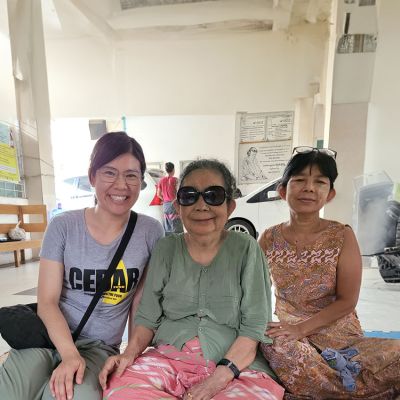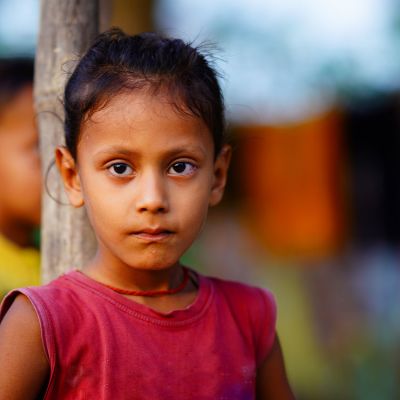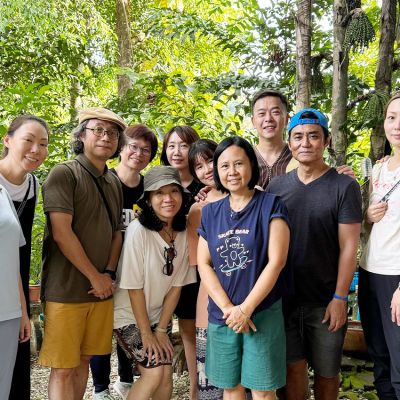Gloria Cheung (Senior Communications Officer)
CEDAR Fund’s new Chief Executive, Dr. Fung Wan Yi (Winnie), comes across as a polite and smiling lady, and, to our surprise, she knows how to drive a motorcycle and shoot, which were learned for visiting and working in poverty-stricken areas. Was she a bold and daring person? Winnie immediately denied, ‘Of course not! It was just because motorcycles are often used in impoverished areas, and firearms are seen from time to time in war-torn areas, so it is always good to know about them.’
Winnie’s dedication to those experiencing poverty began by seeing the ‘unseen’, causing her to quit her role as a scholar and serve in a poverty alleviation organisation. How far is the distance between seeing and changing? Although the answer is different for everyone, for Winnie, her every sight significantly changes her life’s direction.
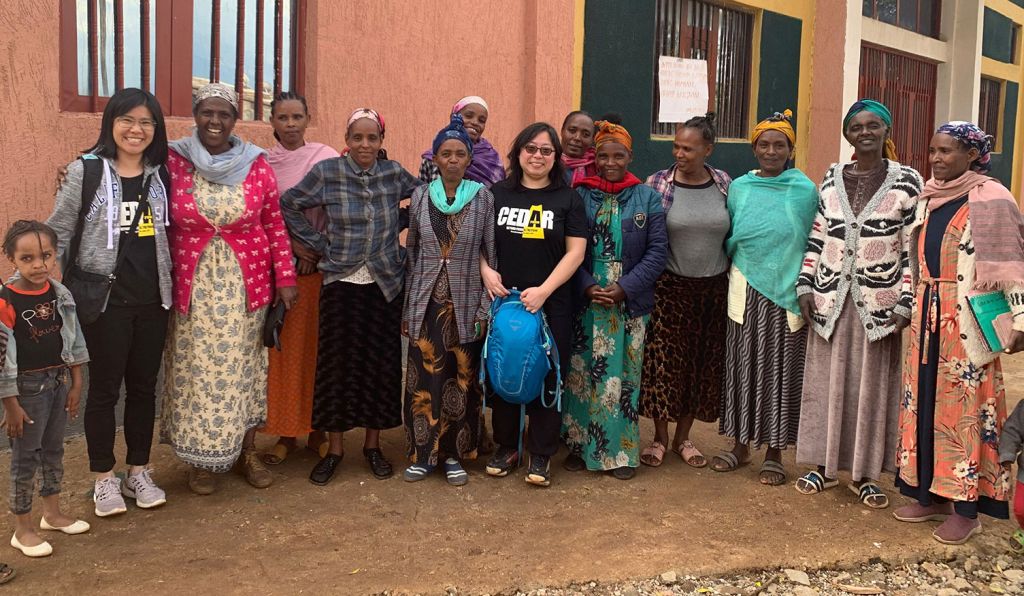
The Three Sights of Those in Poverty
Winnie has loved studying, especially mathematics, since young. Having excelled in high school, she was admitted to Harvard University in the United States, majoring in applied mathematics. After graduating, she pursued a PhD in economics at Harvard Business School because she wanted to teach at universities. She then taught economics at Wheaton College, a prestigious Christian institution in the United States, and even obtained a tenure.
However, the Lord changed her future life path through her three sights of those experiencing poverty – giving up the ‘iron rice bowl’ (lifetime employment) of academia and joining CEDAR, a donation-based organisation located at an industrial building in Kwun Tong, to participate in the CEDAR’s service and walk with the impoverished who are in dire straits.
Her first sight came in her first year of PhD study. She went to Manila, the Philippines, with a student mission organisation to visit the slums and fell ill in the third week due to poor sanitation. ‘I asked the Lord, “I don’t know what I’m doing, and the books I read and the knowledge I learn have nothing to do with where I am now.” At that moment, the Lord showed me that no matter how good my grades were and how many degrees I had, it meant nothing to the young Filipino couple and their hungry baby beside me. But at the same time, the Lord showed me that studying economics is very meaningful, enabling me to help people from a socioeconomic perspective. So when I returned to the United States., I changed my major from corporate finance to economic development, focusing on hunger and poverty.’ That was the first turning point.
The second sight came from her short-term mission in an Islamic country in North Africa. She followed the country’s custom, wearing a headscarf and a robe like other women. One day after she returned to the United States, she saw many people covering their faces and wearing headscarves on the street. She realised that not only in the Islamic country but also in the community where she lived in the States, there were many such ‘neighbours’ with their faces covered, but she had never seen them. ‘At that moment, the Lord let me see my “unseen”! They were by my side every day, but I didn’t see them.’
The third sight was seeing her common humanity with people experiencing poverty during that trip to North Africa. She once went to a public bath with a few girls wearing burqas. Because of the language, religion and cultural differences, she estimated that there must have been many communication barriers. Unexpectedly, when they went to the bath and took off their burqas, she realised the girls had much in common. Under the burqas, they loved beauty and cared about their figures. ‘The Lord showed me that we are not any different and have the same desire for love, security, and respect. Since then, whenever I come into contact with people in poverty, I feel very close to them, and even every time a plane lands in an impoverished country, I feel like I am at home.’
These experiences led Winnie to decide in 2018 to leave everything she had established in the United States and return to Hong Kong because she believes that the centre of Christian faith has shifted from Western countries to Asia, Africa, and Latin America, a region collectively known as the ‘majority world’, where she longs to experience and participate in the work of the Lord. ‘According to statistics, there are 2.5 billion Christians in the world. For every 100 Christians, about 67 live in Asia, Africa and Latin America, and 79 in countries with moderate or high levels of corruption, where the Spirit of the Lord is working.’
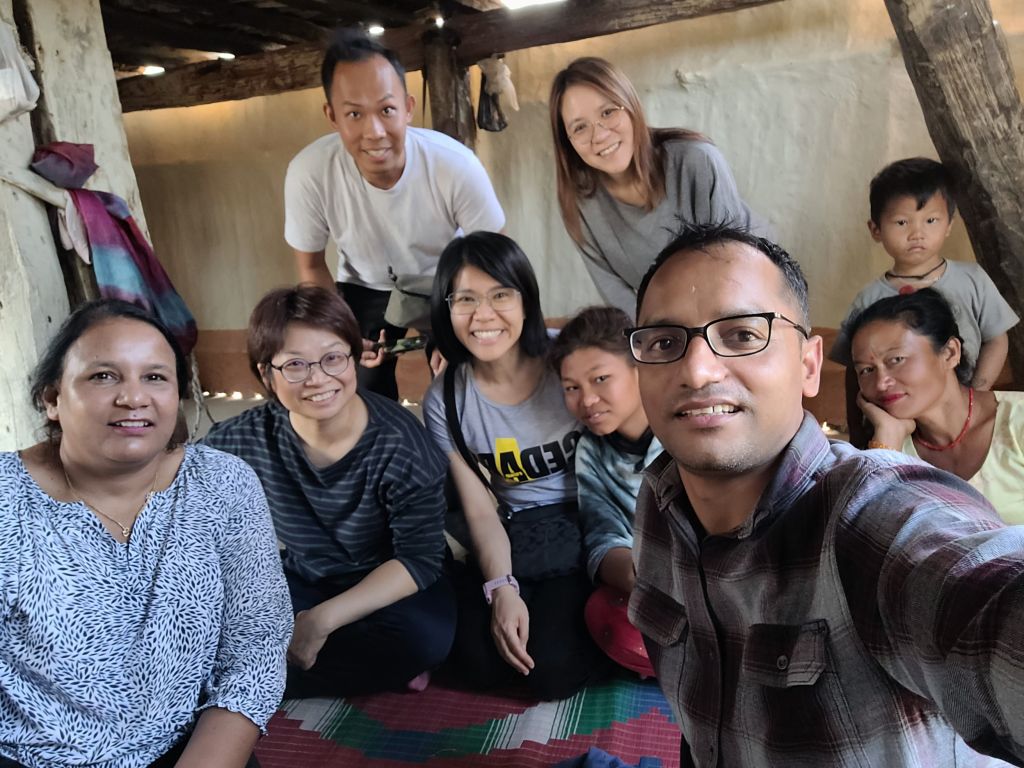
CEDAR Fund’s International Role and Prophetic Nature
After returning to Hong Kong, she was invited to join the Board of Directors of CEDAR, where she got up close and personal with the CEDAR’s work. Despite its small size, Winnie found that the CEDAR played a crucial role in the international arena of Christian poverty alleviation.
‘CEDAR Fund is a founding member of the Integral Alliance (IA), a global coalition of Christian relief and development organisations. IA has 20 members, and like CEDAR, all carry out poverty alleviation and development and relief work based on the integral mission and holistic Gospel. CEDAR is the only non-white representative from the Asian, African and Latin American regions.’ She pointed out that through this network, CEDAR’s work can be extended to 85 countries, reaching partners in more than 500 impoverished countries and thus being able to quickly participate in earthquake relief efforts such as Syria and Afghanistan.
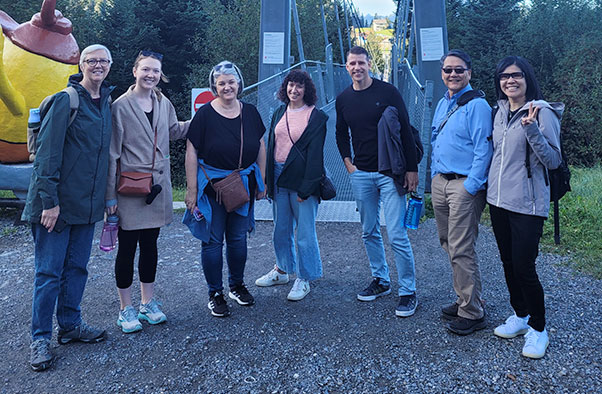
Winnie said that if she used one word to describe CEDAR, it would be prophetic. ‘CEDAR Fund’s development over the past 32 years has been “avant-garde”, being a thought leader in the church’s witness, its integral mission, and God’s involvement in the “majority world” and “global south”.’ (Note: ‘developing countries’ and ‘the third world’ are replaced by the ‘global south’.)
Three Trends in Poverty Alleviation and Development
As the new Chief Executive, Winnie shares a few trends she sees in poverty alleviation and how they will impact CEDAR Fund’s work in the future.
Firstly, she believes that the centre of faith of the universal church has shifted to Asia, Africa and Latin America. Hence, she hopes CEDAR can be a ‘matchmaker’ to connect Hong Kong believers with the needs of churches in Asia, Africa and Latin America and effectively walk with local people in poverty. Secondly, Hong Kong’s role in the international arena has changed with the rise of China. Hong Kong was a window for dialogue between China and Western countries, and it will be advantageous as a bridge between ASEAN countries and the West. As a result, CEDAR will allocate 60% of its resources to Southeast and South Asian countries, 15% to Africa, 10% to the Middle East, and the remaining 15% locally. Thirdly, poverty alleviation and disaster relief were two different concepts. However, with the intensification of natural disasters and the escalation of political conflicts, poverty alleviation and development, humanitarian assistance, and peace-building will no longer be separated but must be carried out simultaneously.
Many people are concerned about whether Winnie will adapt from a university campus to a poverty alleviation organisation. However, she asked everyone to rest assured because her teaching has been related to poverty alleviation and development and the integral mission. ‘Although my role has changed, the core values remain the same.’
Pray that with Winnie’s knowledge and experience in poverty alleviation and development, the Lord will lead the staff of CEDAR, hand in hand with supporters, to continue to shoulder the mission of poverty alleviation in the changing and complex era.
Dr. Winnie Fung is a development economist with a PhD in Business Economics from Harvard University and an MA in Biblical Studies from Wheaton College. Before joining CEDAR Fund, she taught at two Christian higher education institutions (Wheaton College in the United States and Lumina College in Hong Kong) for over 12 years. Winnie loves teaching and sharing information about the holistic Gospel and transformational development. She is passionate about working with and learning from people experiencing poverty in developing countries.
Please click here to view the highlights of ‘Seeing is Changing’, the Inauguration Ceremony of the Chief Executive of CEDAR Fund. (Chinese only)
ARTICLES OF THIS ISSUE
Gloria Cheung (Senior Communications Officer) CEDAR Fund’s new Chief Executive, Dr. Fung Wan Yi (Winnie), comes across…
Written by Fountain Chik (Theology Development Officer) Scriptures reading: John 1:38-40 38Turning around, Jesus saw t…
Written by Gloria Cheung (Senior Communications Officer) Contact with life has the most transformative power to change…



